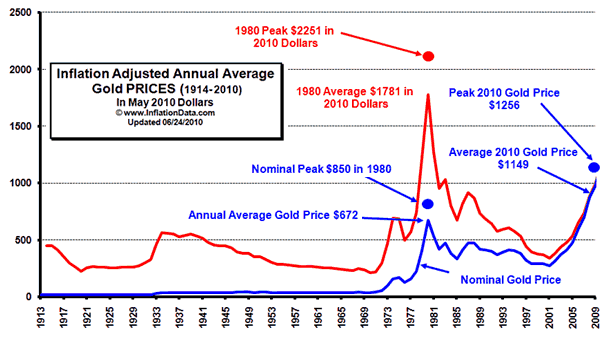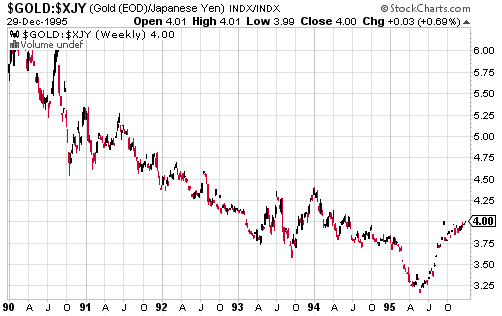One of gold's allures is its use as a hedge against negative economic outcomes: inflation, deflation, general economic collapse and even war. Investors and speculators enter the market based on their guesstimate of how bad things might get. But unless they know about this powerful market force, they might as well be throwing darts.
Earlier, while discussing discrepancy between the value of gold and supply and demand, we determined that there must be other factors driving prices. Today, I want to examining how gold performs during inflation and deflation to see if we can uncover the secret market force that's driven gold prices by +370% over the last 10 years. Then we can address the other reasons investors and traders have started paying attention to gold.
A Hedge Against Inflation?
Many investors see gold as a way to protect their assets against inflation. However, time has shown that this is flawed logic. Looking back at history, had gold kept pace with inflation, it would be selling at more than $2,000 an ounce today. Currently, it's trading just above $1,250.
The chart below shows the inflation adjusted value of gold in May 2010 dollars (in red) and the actual value of gold (in blue). If gold were a good hedge against inflation, it would have traded at or above the inflation-adjusted price, not its nominal price.

Historically, gold has not held its value during times of inflation. If you owned gold when inflation rose, your net worth did not keep up. Compounding the problem, gold does not generate cash flow and it incurs an ongoing cost for storage and insurance. All these add up to a poor hedge against inflation. Moreover, during the last 30 years, gold substantially lagged behind both the S&P 500 and bonds (as measured by the Merrill Lynch Bond Index).
A Hedge Against Deflation?
Deflation occurs when the total supply of money and credit fall, often leading to a drop in the general price level. [Read more about deflation and its causes here.]
The last remaining official link between gold and the U.S. dollar ended in 1971. We have not had an occurrence of deflation since, so it is difficult to draw any historical conclusion on how gold might react given our current currency. However, we are able to draw some strong conclusions by looking at silver's performance in the U.S. during the Great Depression and gold's performance against the Yen after Japan's credit bubble burst.
In the U.S., the price of silver in 1932 (the peak of the 30s deflationary spiral) was -50% below its price in 1929. If the price of silver fell during the deflation of the 30s, it is reasonable to assume the price of gold, a similar commodity, would fall as well during a period of deflation.
While Japan did not experience actual deflation, the country's money supply fell from a double-digit rate in late 1989 to the 2% range in late 1990. The money supply remained at that low level for several years. In the United States, the money supply, as measured, is essentially flat. The threat of deflation remains. If it does occur, there is some evidence to say the price of gold will fall rather than rise, as many expect.
In the chart below, the price of gold in Yen terms trended down throughout the first half of the 90s. Had there been actual deflation as the money supply contracted, the price of gold would have fallen by at least as much. Not much of a hedge against deflation.

The Secret factor Propelling Gold Prices
There's an interesting opinion that gold is really a hedge against the loss of confidence. If a loss of confidence in both the economy and the currency is accompanied by inflation, we will most likely see the price of gold rise. This explains why gold prices rise during one period of inflation (1970s -- low confidence), but fall in another (1990s -- high confidence). Many gold bugs fail to understand this distinction.
Nobel Prize winning economist Paul Krugman claims it is a lack of confidence that leads to a currency crisis. When investors lack confidence in a currency, they turn to other forms of investment. Gold is definitely the place to seek safety if you believe there is a growing crisis of confidence.
The Bottom Line
So, can gold act as a hedge against inflation and deflation? It does not make sense to assume gold can act as both a hedge against inflation and deflation at the same time. Rather, gold is more suited to act as a hedge against a loss of confidence in the economy or a currency. In the next installment, we'll focus more on the relationship between gold prices and confidence in the economy, and see if we can distill any major rules regarding entering and exiting the gold market.



